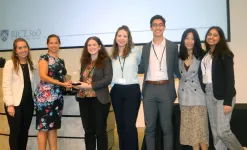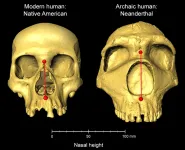(Press-News.org) University of Minnesota Twin Cities researchers have developed a groundbreaking new diagnostic technique that will allow for faster and more accurate detection of neurodegenerative diseases. The method will likely open a door for earlier treatment and mitigation of various diseases that affect humans, such as Alzheimer's and Parkinson's, and similar diseases that affect animals, such as chronic wasting disease (CWD).
Their new study is published in Nano Letters, a premier journal in the field of nanotechnology published by the American Chemical Society.
“This paper mainly focuses on chronic wasting disease in deer, but ultimately our goal is to expand the technology for a broad spectrum of neurodegenerative diseases, Alzheimer’s and Parkinson’s being the two main targets,” said Sang-Hyun Oh, senior co-author of the paper and a Distinguished McKnight University Professor in the University of Minnesota Department of Electrical and Computer Engineering. “Our vision is to develop ultra-sensitive, powerful diagnostic techniques for a variety of neurodegenerative diseases so that we can detect biomarkers early on, perhaps allowing more time for the deployment of therapeutic agents that can slow down the disease progression. We want to help improve the lives of millions of people affected by neurodegenerative diseases.”
Neurodegenerative diseases such as Alzheimer's, Parkinson's, mad cow disease, and CWD (widely found in deer) share a common feature—the buildup of misfolded proteins in the central nervous system. Detecting these misfolded proteins is crucial for understanding and diagnosing these devastating disorders. However, existing diagnostic methods, like enzyme-linked immunosorbent assay and immunohistochemistry, can be expensive, time-consuming, and limiting in terms of antibody specificity.
The University of Minnesota researchers’ method, dubbed Nano-QuIC (Nanoparticle-enhanced Quaking-Induced Conversion), significantly improves the performance of advanced protein-misfolding detection methods, such as the NIH Rocky Mountain Laboratories’ Real-Time Quaking-Induced Conversion (RT-QuIC) assay.
The RT-QuIC method involves shaking a mixture of normal proteins with a small amount of misfolded protein, triggering a chain reaction that causes the proteins to multiply and allowing for the detection of these irregular proteins. Using tissue samples from deer, the University of Minnesota team demonstrated that adding 50-nanometer silica nanoparticles to RT-QuIC experiments dramatically reduces detection times from about 14 hours to only four hours and increases the sensitivity by a factor of 10.
A typical 14-hour detection cycle means that a lab technician can run only one test per normal working day. However, with a detection time of less than four hours, researchers can now run three or even four tests per day.
Having a quicker and highly accurate detection method is particularly important for understanding and controlling transmission of CWD, a disease that is spreading in deer across North America, Scandinavia, and South Korea. The researchers believe that Nano-QuIC could eventually prove useful for detecting protein-misfolding diseases in humans, specifically Parkinson's, Creutzfeldt-Jakob Disease, Alzheimer's, and ALS.
“Testing for these neurodegenerative diseases in both animals and humans has been a major challenge to our society,” said Peter Larsen, senior co-author of the paper and an assistant professor in the University of Minnesota Department of Veterinary and Biomedical Sciences. “What we’re seeing now is this really exciting time when new, next generation diagnostic tests are emerging for these diseases. The impact that our research has is that it’s greatly improving upon those next generation tests, it’s making them more sensitive, and it’s making them more accessible.”
The research was funded by the Minnesota Environment and Natural Resources Trust Fund as recommended by the Legislative-Citizen Commission on Minnesota Resources (LCCMR); the Minnesota Agricultural Experiment Station Rapid Agricultural Response Fund; and the Minnesota Agricultural, Research, Education, Extension and Technology Transfer (AGREETT) program.
“Minnesotans value science and support basic and applied research. As legislators, we have invested Environmental Trust Fund dollars to provide solutions for complex problems like chronic wasting disease,” said Representative Rick Hansen, chair of the Minnesota House Environment and Natural Resources Committee and co-chair of the LCCMR. “I am proud of the work of the LCCMR and the legislature in supporting this research and will continue to advocate for funding to research and prevent future problems affecting our wildlife and ourselves.”
Larsen and Oh lead the University’s Minnesota Center for Prion Research and Outreach (MNPRO) molecular diagnostic research and development team, which leverages this government funding to conduct research on protein misfolding diseases that greatly impact the state of Minnesota.
In addition to Oh and Larsen, the team involved in this paper included University of Minnesota Twin Cities researchers Peter Christenson (lead author and Ph.D. candidate in the Department of Electrical and Computer Engineering), Manci Li (Ph.D. candidate in the Comparative and Molecular Biosciences Program), and Gage Rowden (researcher in the Department of Veterinary and Biomedical Sciences).
END
U of M researchers develop technique for rapid detection of neurodegenerative diseases like Parkinson’s and Chronic Wasting Disease
Researchers’ groundbreaking new diagnostic technique will allow for faster and more accurate disease detection
2023-05-08
ELSE PRESS RELEASES FROM THIS DATE:
Rice University students design congenital hypothyroidism test for newborns
2023-05-08
HOUSTON – (May 8, 2023) – For newborns with congenital hypothyroidism, early diagnosis spells the difference between a normal, healthy life and lifelong disability.
After learning about the heavy toll the disease takes on children born in parts of the world where testing is limited or absent, a team of Rice University students came together to develop a low-cost screening tool that can detect abnormally high thyroid-stimulating hormone (TSH) levels indicative of dysfunction.
The point-of-care, paper-based test developed ...
Culture, diet, economic factors and more affect CVD risk among Asian Americans
2023-05-08
Statement Highlights:
Health research that considers Asian Americans as a single race and ethnic group may result in over- or under-estimating the risk of Type 2 diabetes and cardiovascular disease among people of diverse Asian American subgroups, by geographic region of descent.
Together, cardiovascular disease and Type 2 diabetes are the leading causes of death and disease in Asian American adults, however, rates vary widely among subgroups. For example, the latest data on the prevalence of Type 2 diabetes in Asian American adults, ages 45-84, reveals a range of Type ...
Nose shape gene inherited from Neanderthals
2023-05-08
Humans inherited genetic material from Neanderthals that affects the shape of our noses, finds a new study led by UCL researchers.
The new Communications Biology study finds that a particular gene, which leads to a taller nose (from top to bottom), may have been the product of natural selection as ancient humans adapted to colder climates after leaving Africa.
Co-corresponding author Dr Kaustubh Adhikari (UCL Genetics, Evolution & Environment and The Open University) said: “In the last 15 years, since the Neanderthal genome ...
Immunotherapy plus chemotherapy combination for advanced lung cancer not only prolongs life but also improves its quality
2023-05-08
A recent clinical trial showed that the drug combination of cemiplimab plus platinum chemotherapy can prolong survival in patients with advanced lung cancer when compared with placebo plus platinum chemotherapy. Now an analysis published by Wiley online in CANCER, a peer-reviewed journal of the American Cancer Society, indicates that cemiplimab plus platinum chemotherapy also affects quality of life compared to chemotherapy alone.
The multinational phase 3 EMPOWER-Lung 3 trial had shown that the addition ...
Organoids derived from patient tissues support personalized cancer treatment
2023-05-08
Chicago (May 2, 2023) — Researchers created organoids from cancer cells to reduce the need for trial and error in identifying effective cancer treatments in one of many cancer studies scheduled for presentation this week at Digestive Disease Week® (DDW) 2023.
Below are summaries of three studies scheduled for DDW, their embargo times and presentation times at the meeting in Chicago May 6-9.
Personalized drug screening in patient-derived organoids of biliary tract cancer and its clinical application
Chemotherapy is often the only treatment option for biliary tract cancer, which is usually found at a late stage, making it one of the most lethal ...
Cognitive behavioral therapy lessens post-viral fatigue after COVID-19
2023-05-08
Those with post-viral fatigue after suffering from COVID-19 benefit from cognitive behavioural therapy, resulting in less fatigue and concentration problems. Lead researcher, Hans Knoop, Professor of Medical Psychology at Amsterdam UMC found that “After behavioural therapy, patients not only had less symptoms but also functioned better both physically and socially. Those improvements were still present even after six months.” Today, research from Amsterdam UMC, RadboudUMC and three other hospitals is published in Clinical Infectious Diseases.
After a COVID-19 infection, a substantial number of patients report persisting symptoms. This is often known as long-COVID or ...
Examining the adhesion tendency of biofilm-forming bacteria on organic surfaces
2023-05-08
The biofilm-forming bacteria E. coli adheres firmly to hydrophobic and hydrophilic protein-adsorbing self-assembling monolayers (SAMs) and weakly to hydrophilic protein-resisting SAMs, uncovered a recent study by Tokyo Tech researchers. These findings on how surface chemistry can influence the adhesion of bacterial cells and, in turn, biofilm formation could open doors to bacteria-resistant surfaces and antibiofouling coatings for biomedical and industrial devices.
Bacterial biofilms are like a double-edged sword. On one hand, they have proven valuable ...
New decision aid to help with screening to prevent fragility fractures
2023-05-08
Should healthy people be screened to help reduce their risk of fragility fractures? A new interactive online Fragility Fracture Decision Aid for shared decision-making can help clinicians and patients visualize their individual risk of fracture and the potential benefits and harms of preventive treatment.
The decision aid is part of a new guideline https://www.cmaj.ca/lookup/doi/10.1503/cmaj.221219 from the Canadian Task Force on Preventive Health Care on screening to prevent fragility fractures. The guideline, ...
Pediatric IBD risk linked to antibiotics, Western diet and higher family income
2023-05-07
CHICAGO (May 7, 2023) — Children and adolescents face greater risk of inflammatory bowel disease (IBD) when exposed to antibiotics or a Western diet at early ages, or when their family has higher socioeconomic status, according to a study being presented today at Digestive Disease Week® (DDW) 2023.
“Pediatric IBD cases are rising globally, and approximately 1 in 4 of all IBD cases are now diagnosed before age 21,” said Nisha Thacker, the study’s lead author and a gastrointestinal dietitian. A unique concern about pediatric IBD is the impact that the inflammation has on a child’s growth and the progression of puberty, ...
Domestic abuse exposure linked to increased levels of asthma and other atopic diseases
2023-05-06
Women who have suffered domestic abuse may have a higher risk of developing atopic diseases including asthma, new research has found.
Published today in the Journal of Allergy and Clinical Immunology: In Practice, the research led by the University of Birmingham found that in analysis of patient records, there were a significantly larger percentage of women who had atopic diseases and had a history of being exposed to domestic abuse and violence compared to those who hadn’t.
Dr Joht Singh Chandan from the University of Birmingham and corresponding author of the study said:
“After adjusting for possible cofounders, ...
LAST 30 PRESS RELEASES:
SfN announces Early Career Policy Ambassadors Class of 2026
Spiritual practices strongly associated with reduced risk for hazardous alcohol and drug use
Novel vaccine protects against C. diff disease and recurrence
An “electrical” circadian clock balances growth between shoots and roots
Largest study of rare skin cancer in Mexican patients shows its more complex than previously thought
Colonists dredged away Sydney’s natural oyster reefs. Now science knows how best to restore them.
Joint and independent associations of gestational diabetes and depression with childhood obesity
Spirituality and harmful or hazardous alcohol and other drug use
New plastic material could solve energy storage challenge, researchers report
Mapping protein production in brain cells yields new insights for brain disease
Exposing a hidden anchor for HIV replication
Can Europe be climate-neutral by 2050? New monitor tracks the pace of the energy transition
Major heart attack study reveals ‘survival paradox’: Frail men at higher risk of death than women despite better treatment
Medicare patients get different stroke care depending on plan, analysis reveals
Polyploidy-induced senescence may drive aging, tissue repair, and cancer risk
Study shows that treating patients with lifestyle medicine may help reduce clinician burnout
Experimental and numerical framework for acoustic streaming prediction in mid-air phased arrays
Ancestral motif enables broad DNA binding by NIN, a master regulator of rhizobial symbiosis
Macrophage immune cells need constant reminders to retain memories of prior infections
Ultra-endurance running may accelerate aging and breakdown of red blood cells
Ancient mind-body practice proven to lower blood pressure in clinical trial
SwRI to create advanced Product Lifecycle Management system for the Air Force
Natural selection operates on multiple levels, comprehensive review of scientific studies shows
Developing a national research program on liquid metals for fusion
AI-powered ECG could help guide lifelong heart monitoring for patients with repaired tetralogy of fallot
Global shark bites return to average in 2025, with a smaller proportion in the United States
Millions are unaware of heart risks that don’t start in the heart
What freezing plants in blocks of ice can tell us about the future of Svalbard’s plant communities
A new vascularized tissueoid-on-a-chip model for liver regeneration and transplant rejection
Augmented reality menus may help restaurants attract more customers, improve brand perceptions
[Press-News.org] U of M researchers develop technique for rapid detection of neurodegenerative diseases like Parkinson’s and Chronic Wasting DiseaseResearchers’ groundbreaking new diagnostic technique will allow for faster and more accurate disease detection




